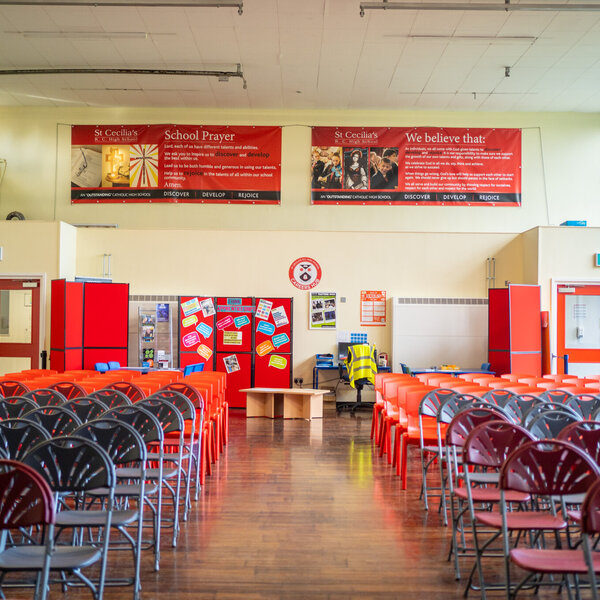
At St. Cecilia’s, we believe that the importance of revision is twofold. Firstly, it helps you to remember facts, figures, topics and methodologies that you have covered some time ago. Secondly, If done correctly it will help increase your confidence and reduce anxiety – you will be well prepared for your examination. As we approach final exams at the end of Year 11, we focus very specifically on both of these intended successes above.
Revision Lessons Before, During and After School
The timetable below outlines all of the opportunities currently available in school to assist with your exam preparation in the presence of a subject expert.
12-Week Year 11 Revision Plan
Our 12 week GCSE revision revision plan’ begins upon our return to school February half term and runs until the week of the first exam in May. For our Y11 pupils, this replaces homework and is compulsory. Each subject prepares 12 tasks that guide our pupils through their entire course once more. The plan is signed off by parents/carers at home each night, checked by form teachers each morning and by subject teachers each lesson. Completing the revision plan works. 97% of our pupils describe it as ‘invaluable’. Below is an example of this year’s revision plan.
Revision Clinics
We offer one-on-one based revision intervention that is for both selected pupils and available to everyone. Pupils write down their barriers to revising and then we jointly create tailor made interventions to assist with what works best, including a to-do list. In addition, our Futures Evening as well as all KS4 Parents’ Evenings offer bespoke revision masterclass and preparation sessions.
Our Top Tips For Revision
Start early
Getting an early start on your revision is always a good thing. The more time you allow yourself to revise, the more room you’ll have to cover each subject without needing to cram. You’ll have more time to practice what you need to learn and consolidate it into your memory.
Make a revision timetable
Creating a revision timetable should be your first step. This will allow you to spread out your study time evenly and avoid cramming during the days leading up to your assessments. You can also allocate more time to any subjects you’re struggling with.
Set mini goals
Have a few mini goals you’d like to achieve by the end of each day. You can add these in when making your revision timetable. This’ll give you an idea of how much revision you need to do and what’s coming up. You’ll avoid feeling overwhelmed and can break your study down into smaller chunks.
Mix it up
Work out which learning styles work for you. This could be visual, auditory, kinaesthetic or through reading and writing. Once you have a few different revision techniques, mix up which ones you want to use so that revision doesn’t become repetitive or dull. See these great and varied ways to revise here: https://www.whatuni.com/advice/sixth-form-life/21-alternative-ways-to-revise/72112/
Revise with others
You may benefit from teaching others what you know or testing them on what they know. Not only is this a great way to help your friends but you’ll see where there’s still holes in your own learning. Having a small study group can also be a great way to come up with unique methods for remembering key ideas.
Practice papers
Use practice papers to familiarise yourself with the format of your assessment and how questions may be structured. Time yourself to avoid getting flustered when sitting the actual assessment, and you’ll be able to gauge how much time to roughly spend on each question.
Take breaks
Revision is only effective when split up by breaks. Don’t overwork yourself and make sure you’re giving your brain some space to breathe. You’ll get distracted less and be able to focus for longer. Use these breaks to fit in any exercise or healthy eating, which will only improve the quality of your revision.
Move around
A productive way to spend your study break. The benefits of exercise on revision include increased focus, improved memory and the chance to readdress any hard topics with a fresh mind. A simple walk around the block can be all it takes to improve your quality of learning.
Eat healthy
Choose healthy foods to eat during your study breaks. The quality of what you put in will dictate the quality you put out. Swapping crisps or chocolate for nuts or fruit will leave you feeling less lethargic in the afternoon and with more energy to learn. But do remember balance. You don’t have to cut out your favourite treats completely. Moderation is key.
Sleep
These GCSE revision tips won’t be effective unless you get sufficient sleep. Prioritise getting 7–9 hours a night. Sleep is a powerful tool for not only committing what you’ve learnt during the day to long-term memory, but it also improves your cognitive ability to learn again the following day. You’ll be better able to concentrate, and feel more motivated, after a good night’s rest.
Plan your revision early
Revision Timetable
Related News
